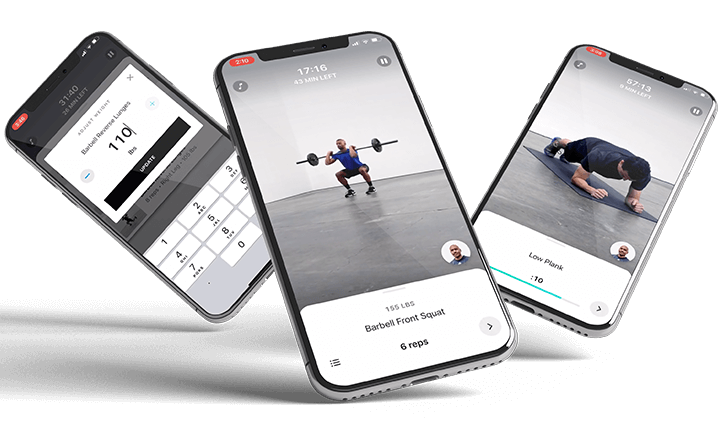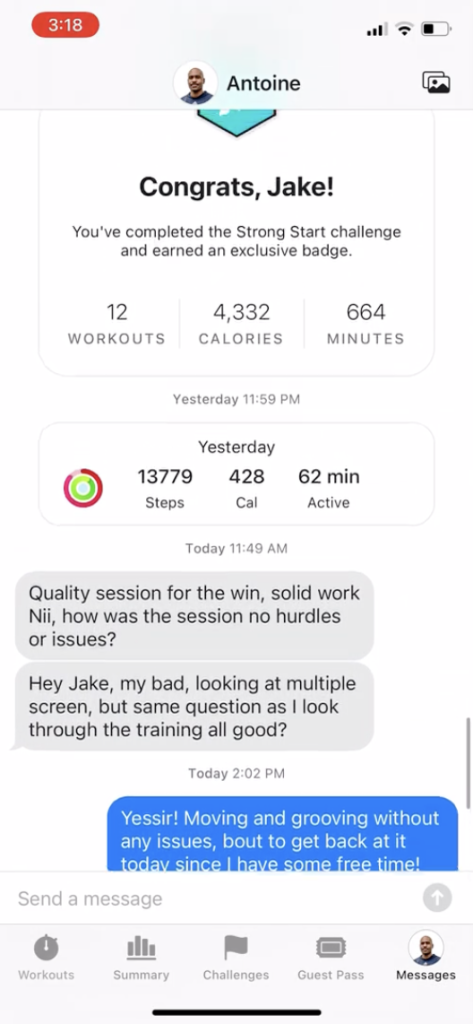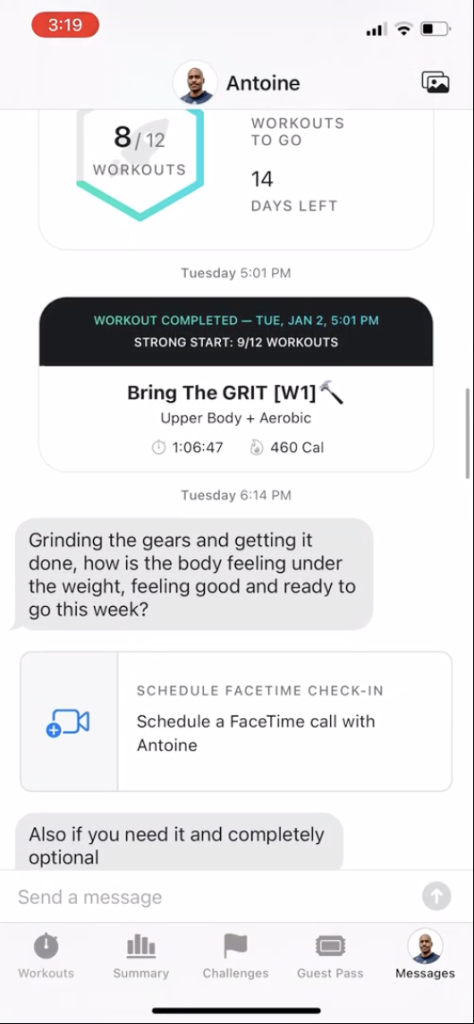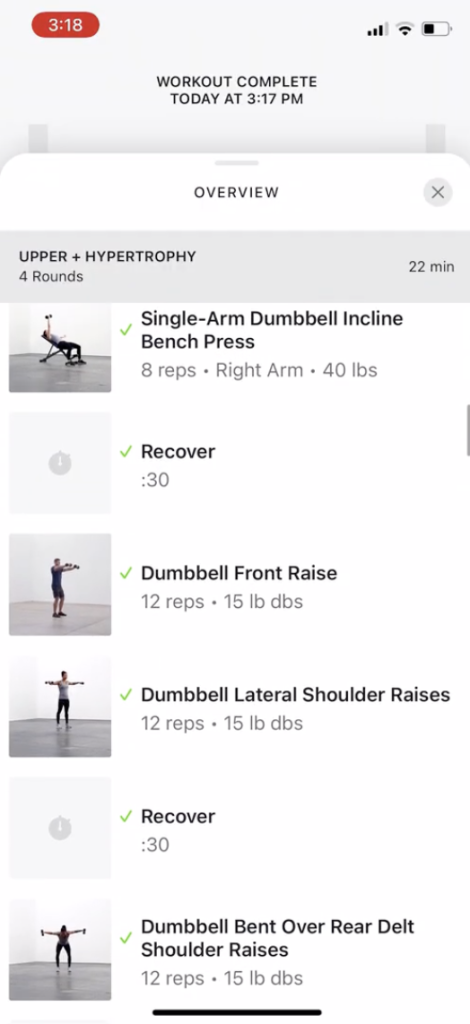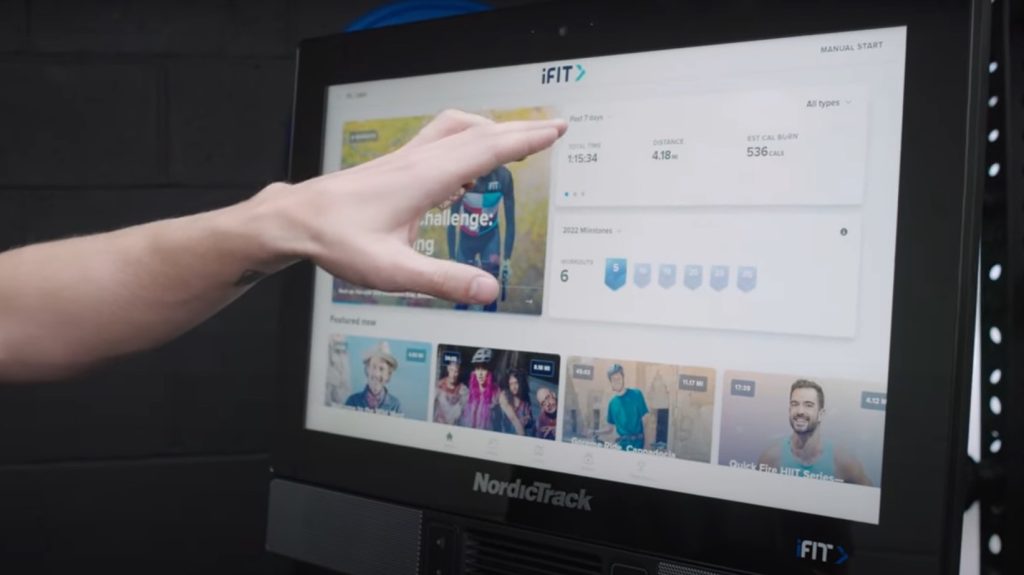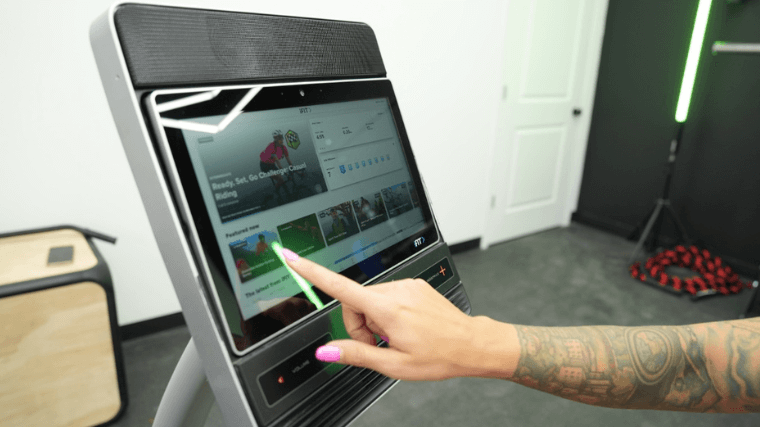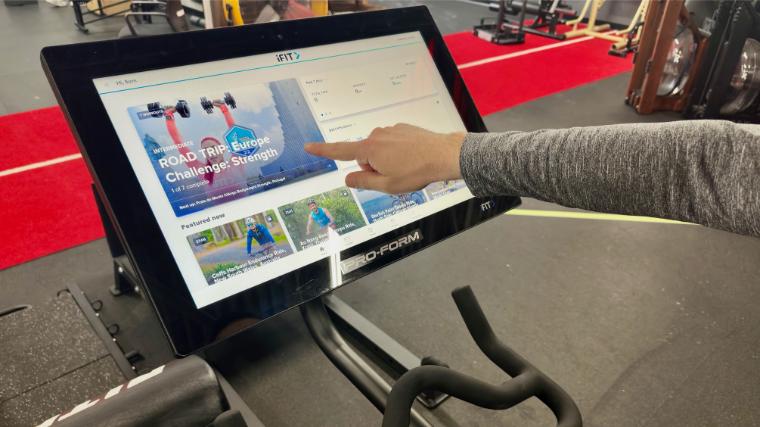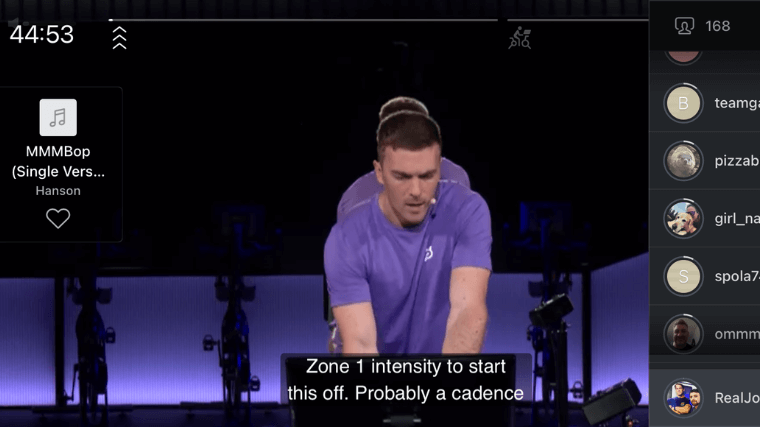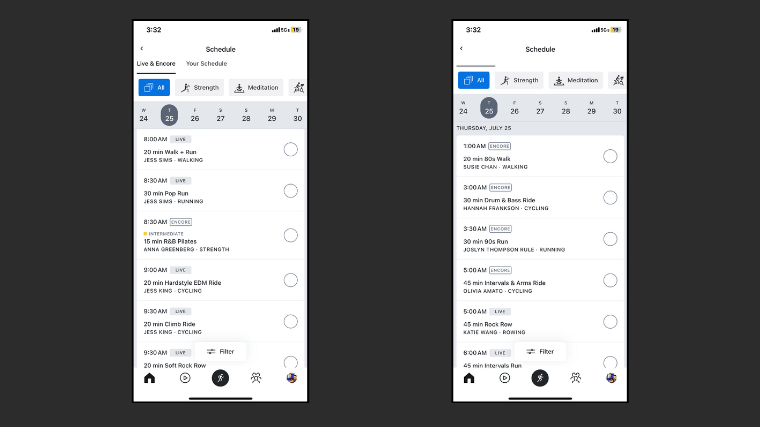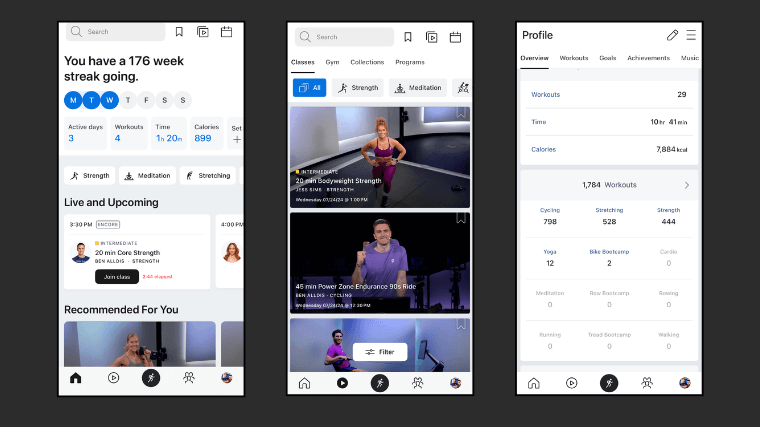In today’s fitness realm, it seems there’s an app for every training discipline. The best online workout programs can deliver the coaching, tips, motivation, and (of course) daily workouts you need directly to your trusted smartphone or tablet. The best fitness apps combine that library of information with engaging, easy to use interfaces that work with your fitness goals.
With so many apps to choose from, however, it can be difficult to determine which platform is the best fit for your home screen. Do you want an app that’s specific to your training interests, or one that caters to a variety of disciplines? What about access to a personal trainer? Can you structure your fitness program on your own, or need a helping hand to keep you moving forward? To help you navigate through the app store, we’ve tested 19 digital platforms, conducted plenty of research, and read through countless customer reviews to land on our favorite fitness apps available today.
The 11 Best Workout Apps of 2026
- Best Workout App Overall: Future
- Best Workout App for Pilates: Reverse Health
- Best Workout App for Personal Training: Caliber
- Best Workout App for Live Classes: iFIT
- Best Workout App for Weight Loss: Noom
- Best Free Workout App: Nike Training Club
- Best Workout App for Beginners: Aaptiv
- Best Workout App for Yoga: Alo Moves
- Best Workout App for Data Tracking: Peloton
- Best Workout App for Running: Nike Run Club
- Best Workout App for Strength Training: Juggernaut AI
Best Workout App Overall: Future

Future offers online personal training in every facet of fitness. Every client gets a certified fitness professional who will prescribe training programs, follow up daily to assess progress, make program adjustments as needed, and offer accountability.
Specs
- Price Per Month: $199
- Equipment Required: Bodyweight, Home Gym, Commercial Gym
- Training Type: Strength and Conditioning
- Available On: iOS, Android
- Free Trial: N/A
If you’re looking for an immersive training experience that’s rich with motivation, advice, and engagement, we highly recommend subscribing to Future. Yes, the monthly membership is expensive at $199, but with that you’re essentially getting a full-fledged personal trainer in your pocket (or on your watch or TV).
We love how tailored Future is to your specific needs — our testers gave their overall experience a 5 out of 5. Once you complete a quick quiz about your fitness level, goals, injury history, and your preferred coaching style, you’re paired with your instructor. You video chat with them for an introduction, and from there, your training plan is customized to your abilities and available equipment.
You don’t need the best squat rack or a bevy of kettlebells and free weights at your disposal, your coach can prescribe bodyweight exercises if you’re limited on training gear.
Our tester also appreciated how informative the workout plans are thanks to the accompanying videos for each prescribed exercise. “During my workouts, every single movement has an accompanied instructional video and audio,” our tester said, giving the instruction a 5 out of 5. “Compared to other apps I’ve tried, Future was definitely among the easiest to follow.”
If you are curious about your technique in a given workout, you can record yourself and send it to your coach for analysis and feedback. This may be a chore for some, but it’s also an example of the great lines of communication at play with Future. You can chat back and forth with your instructor through the app, and even have the opportunity to video call if you need a more involved discussion. We also gave the accountability a 5 out of 5, as your coach keeps you motivated with daily check-ins, reminders to log your workouts, and tips on where you can improve.
As far as user experience is concerned, we experienced no bugs or lagging when navigating the app features. Our tester also appreciated how Future can be used across their smartwatch for added convenience during training. You can also stream your daily workouts to a nearby TV or monitor for larger viewing needs. We found this especially helpful when tackling new, challenging exercises we hadn’t experienced before.
Read our full Future App Review.
Best Workout App for Pilates: Reverse Health
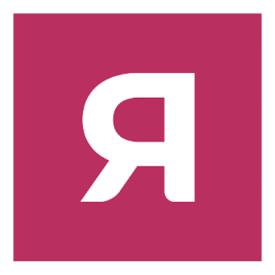
Reverse Health is a weight-loss program app that's specifically designed for people during and after menopause. Reverse Health helps build both exercise and nutrition plans.
Specs
- Price Per Month: Starting at $15 per month
- Equipment Required: Yoga mat, bodyweight, or free weights
- Training Type: Pilates, Yoga, Weight Loss
- Available On: iOS, Android
- Free Trial: No free trial
Interested in Pilates as a go-to fitness discipline for your home workouts? With a heightened focus on women over 40 and their personal fitness and wellness before, during, and post-menopause, Reverse Health offers one of our favorite Pilates programs, which entails 12 weeks of custom workouts designed for your personal goals and skill set.
After completing a basic questionnaire and outlining your intended weight loss goals — Reverse Health’s primary focus is weight loss across a majority of its programming — you’ll receive your easy-to-follow instructions. Our testers note that the workouts are easy to comprehend and feature simple, clear information for each session, rating the clarity at 4 out of 5 for the workout app.
I score the versatility of this app at 3.5 out of 5, too. I do like the included modules for chair yoga and personalized weight loss journeys, but I don’t believe there’s enough content to keep things interesting or engaging for extended periods. Plus, each chosen module has its own questionnaire, which can become annoying when trying to sign up for multiple sessions at once.
As stated before, Reverse Health is primarily focused on supporting older women through health and wellness, especially athletes nearing or currently in menopausal stages. As such, this information may not be ideal or relevant for individuals identifying as male, or those yet to enter those stages of life. That said, though, the attention given to this group of app users is worthwhile enough for us to name Reverse Health as one of our favorite weight loss programs for women.
The app itself is free to download on iOS and Android devices, and you pay for whichever service you plan to use. For example, the Wall Pilates course starts at $15 monthly which I rate at 3.5 out of 5 — average in comparison to other platforms, but not an absolute bargain.
Best Workout App for Personal Training: Caliber
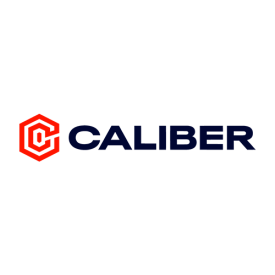
With two coaching subscriptions to choose from (one group oriented and one individualized), Caliber can be an excellent tool for guiding your fitness journey. The prescribed workouts can be tailored to your available equipment, and you’re in constant communication with your personal trainer through the app’s chat feature and video call capabilities.
Specs
- Price Per Month: Starts at $200
- Equipment Required: Bodyweight, Home Gym, Commercial Gym
- Training Type: Strength Training
- Available On: iOS, Android
Having a personal trainer at your disposal can be great for staying diligent in your training, nutrition, and wellness journeys. That said, hiring an individual for these needs can have hourly rates ranging from $25 to over $100. (1) Thankfully, Caliber offers three tiers of subscriptions that cater to a variety of budgets.
There’s a group-oriented Pro version for $19 per month, and a Premium version starting at $200 monthly for individualized coaching. A free version also exists, but doesn’t offer any coaching support but rather a library of trackable gym workouts and instructional videos. Our testers tried out the premium version to give an all-encompassing review.
“My coach talked to me several times each week and tweaked my workouts based on my progress,” our tester said, giving the instruction a 5 out of 5. “The tutorials were incredibly easy to follow with step-by-step instructions.”
Caliber’s main objective lies in strength training, but they also have some programming tailored for bodyweight training to help keep some variety within your exercise routine. Your regimen is designed around progressive overload in select exercises rather than a wide array of movements each week, which we like as progressive overload is one of the best methods for supporting muscle growth and strength increases. (2)
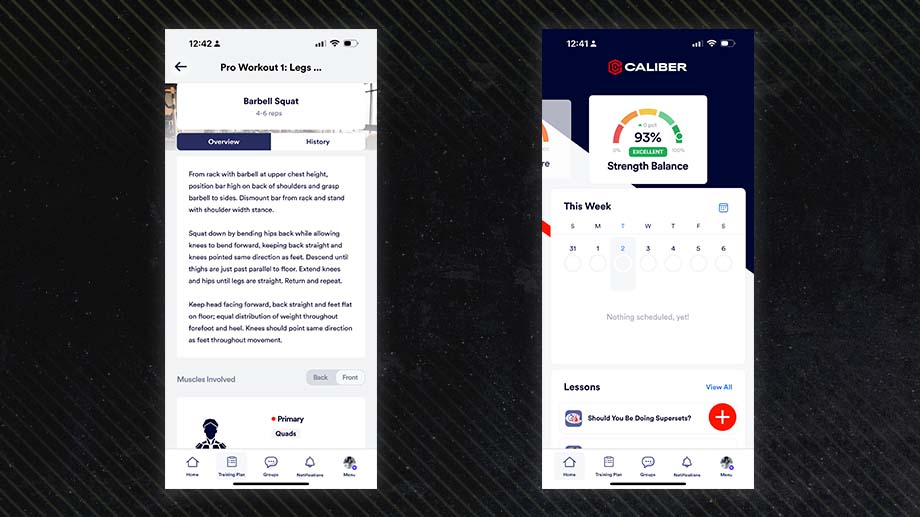
At the Pro level, there are four programs to choose from — one for beginners, one for intermediate to advanced exercisers, one for bodyweight-only workouts, and one focused on weight loss, specifically, how to lose fat and gain muscle. The workouts are built around your available equipment, which our testers found convenient.
“My coach had me weigh in and take progress photos weekly, which I didn’t love,” our tester said. This may not be appropriate for athletes but that being said, it may be helpful for some. We did give the accountability a 3 out of 5, though, as our tester wasn’t able to really find a defined community in the app.
Read our full Caliber Fitness App Review.
Best Workout App for Live Classes: iFIT
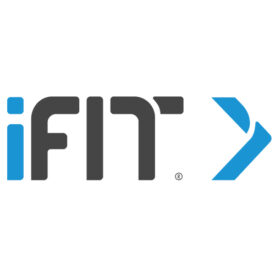
The iFit app features a library of over 16,000 live and on-demand classes that range from mental health and recovery to rowing, running, HIIT and strength classes. You can get the full studio experience virtually through iFit, and is a great boost to any home gym set-up — with or without equipment.
Specs
- Price Per Month: $39
- Equipment Required: iFIT-enabled Cardio Machine, Bodyweight, Dumbbells, Exercise Mat
- Training Type: Cardio, Strength Training, Yoga, Pilates, Mindfulness, Barre
- Available On: iOS, Android
- Free Trial: 30 days free
Fitness apps can also be great for creating a studio-like training experience right in your own home. In our opinion, iFIT’s library of over 17,000 on-demand fitness classes is prime for these needs. The service is compatible with a variety of the best cardio machines from NordicTrack, ProForm, Freemotion, and Matrix, so there’s ample opportunity to get your daily fix. Plus, the platform boasts off-machine workouts, too.
Considering the sheer variety of well-designed workouts, our testers gave their overall experience a 5 out of 5. Our tester, who tested iFIT with a NordicTrack S22i exercise bike, said they had no problem choosing a new session day in and day out across the library which included trainer-led workout videos, HIIT circuits, and ride-along modules powered by Google Maps.
Additionally, iFIT offers an AutoAdjust feature on their compatible devices, which automatically toggles your incline and speed settings in tune with your instructor’s commands. The user interface, in general, is incredibly easy to use, earning iFIT a 5 out of 5 in this category.
We do recommend paying close attention to the equipment requirements before hopping into a session, though. This information is sort of buried in the details, and you could be left scrambling for a dumbbell or resistance band mid-workout if you don’t do your homework prior.
An iFIT subscription is available for $39 monthly, but we appreciate how the platform offers discounts for more dedicated subscriptions, meaning you can save money with longer commitments. Currently, iFIT offers one-year memberships for $396 — a savings of $72. Two-year memberships cost $699 ($237 in savings). A third and final three-year membership is also available for $899, or $505 saved when compared to a monthly subscription for the same duration.
Read our full iFIT Review.
Best Workout App for Weight Loss: Noom
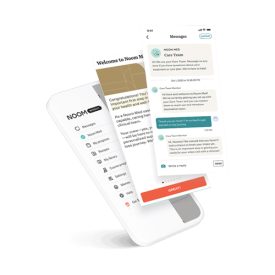
Noom combines psychology and behavioral science with traditional weight loss features like meal and activity tracking, personal coaches, and online communities to help customers adopt a healthier lifestyle.
Specs
- Price Per Month: $70
- Equipment Required: N/A
- Training Type: Nutrition and Wellness
- Available On: iOS, Android
- Free Trial: 14 days
Need a support system when on a weight loss journey? We suggest giving Noom a spot on your home screen. This unique weight loss program takes a psychological approach to redefining your relationship with food. The lessons prescribed throughout your regimen are designed to help you identify your eating habits, understand your diet-related emotions, and develop lifestyle changes and meal plans associated with your nutrition.
Our tester appreciated this approach to weight loss, as they felt it set them up for future success in terms of losing weight and actually keeping it off. Where other weight loss apps help you hit goals through caloric deficits, Noom acts as a coach to help you develop the necessary habits for maintaining your desired body weight.
Additionally, the app uses a color-coding system to identify foods based on their calorie count, with green being the lowest calorie-rich options and red serving as the indicator for high-calorie foods. In terms of user interface, we gave this category a 5 out of 5. Our tester appreciated this unrestricted approach to food options, stating they quickly got the hang of being aware of their intake.
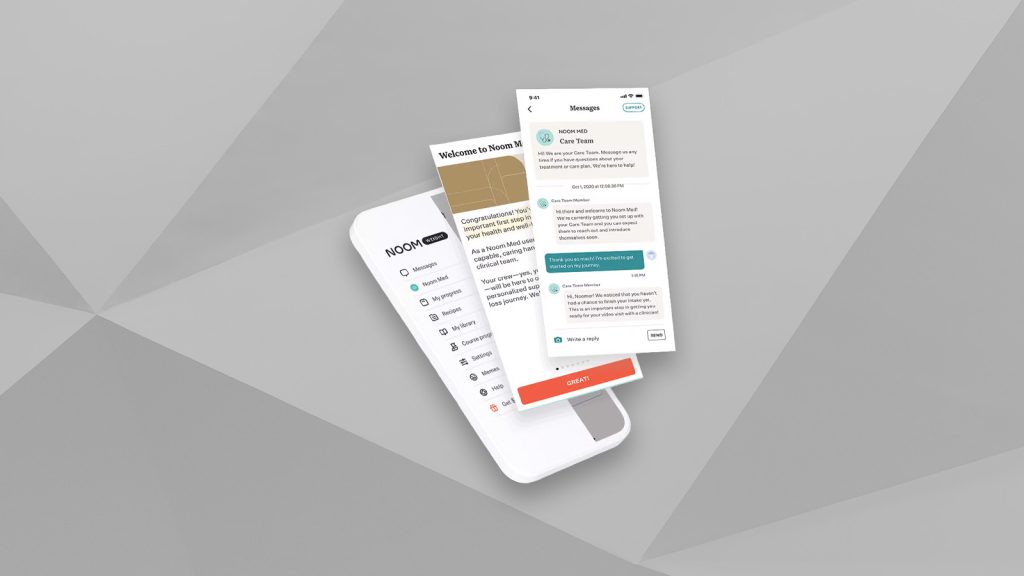
Now, to track your daily caloric intake, Noom does require you to log each meal. While this level of involvement may not suit everyone’s needs, our tester said that this process was easy given the simple user interface. We also liked that it increased accountability, giving this category a 3.5 out of 5, as some apps have more involved accountability measures.
You also track your activities throughout the day — exercise burns calories, after all — and Noom is capable of pairing with the best fitness trackers to monitor your weight and daily step count.
Finally, this psychological approach to weight loss can be tough, especially since there’s less rigidity surrounding which foods you can and shouldn’t eat. Thankfully, Noom provides plenty of support for your journey through the likes of a health coach as well as an online community of fellow users. We found both of these outlets to be extremely helpful in keeping spirits high throughout our regimen.
Read our full Noom Weight Loss App Review.
Best Free Workout App: Nike Training Club

Thanks to a wide variety of periodized regimens as well as live and on-demand fitness classes led by certified personal trainers without any cost of entry. The Nike Training Club caters mostly to strength-based training, but also has sessions for bodyweight training, yoga, pilates, and mobility work.
Specs
- Price Per Month: Free
- Equipment Required: Bodyweight, Home Gym
- Training Type: Strength Training, Yoga, Pilates, Mobility
- Available On: iOS, Android
- Free Trial: Free app
Not every “free” app is worth the time you need to download it. How many times have you downloaded a free version of a platform only to be met with glitchy interfaces, annoying ads, and a paywall that ultimately shutters you from the stuff you downloaded the app for in the first place? Yet despite these stereotypes, there are still a few good eggs in the app store — like Nike Training Club.
Upon sign up, you’re immediately given access to a large library of strength-based workouts as well as sessions for yoga, pilates, HIIT workouts, and mobility. Our tester appreciated how each live and on-demand class was led by certified trainers, giving the quality of instruction a 5 out of 5.
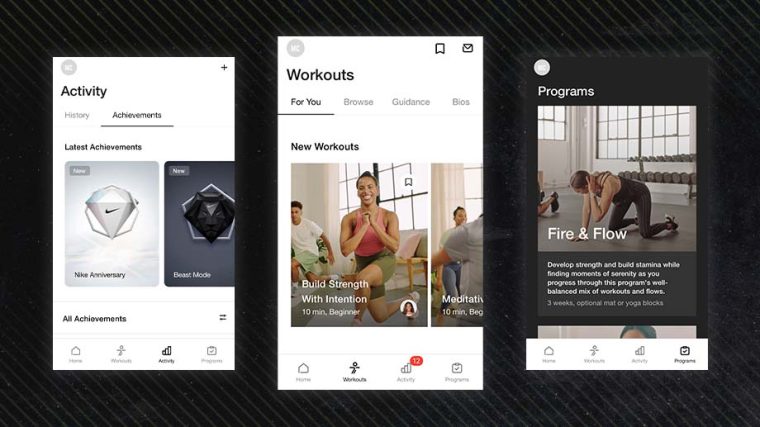
Personally, I love the filter in the search tab for this app, allowing you to pick and choose your preferred workout modality, available equipment, length, etc. The app is generally easy to use and follow, including easy-to-follow exercise videos for the non-live workouts. I’d give the user interface a 5 out of 5.
However, there isn’t much of an accountability factor, so I’d give this category a 2 out of 5. There’s no option to work with a coach, nor is there a live in-app community. As this is a free app, this is totally expected.
The free nature of Nike Training Club can make it easier for you to forgo using it, though. After all, you’re more likely to use a service that you’ve actually invested in over one that only required a few taps.
Best Workout App for Beginners: Aaptiv
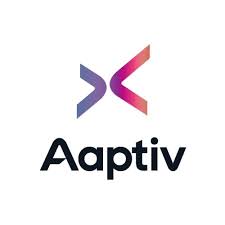
An audio-focused streaming workout app that lets you take your workouts anywhere you want to go.
Specs
- Price Per Month: $14.99
- Equipment Required: Bodyweight, Home Gym, Commercial Gym
- Training Type: Endurance, mobility, strength, yoga
- Available On: iOS, Android
- Free Trial: 45 days
Whether you’re interested in HIIT or LISS training sessions, are a beginner in the fitness space, or are a seasoned athlete, we recommend the Aaptiv Fitness app. For one, we thought the instruction was easy-to-follow and customizable. “You can choose workouts based on your goal, like reducing stress or staying fit,” our tester said, giving the instruction a 4 out of 5. However, it’s clear that the workouts are designed by AI, not a personal trainer. For beginners, though, this shouldn’t be a huge issue.
Unlike some other apps, Aaptiv has a great accountability aspect. There’s a “Team” feature in the app, which is a global feed that allows you to interact with and encourage users around the world. “I also like the habit tracker in the dashboard,” our tester said, giving the accountability a 5 out of 5. “You get to choose a habit you want to build and check it off.”
Unfortunately, we weren’t too thrilled with the user interface, rating it a 3 out of 5. While this app synced easily with our tester’s Apple Watch and took record of all the workouts, it really just imported Apple Health data like how long we were in fat-burning heart rate zones and how much time we spent working out. “There’s not much here that I couldn’t already see in my Apple Health app,” our tester said.
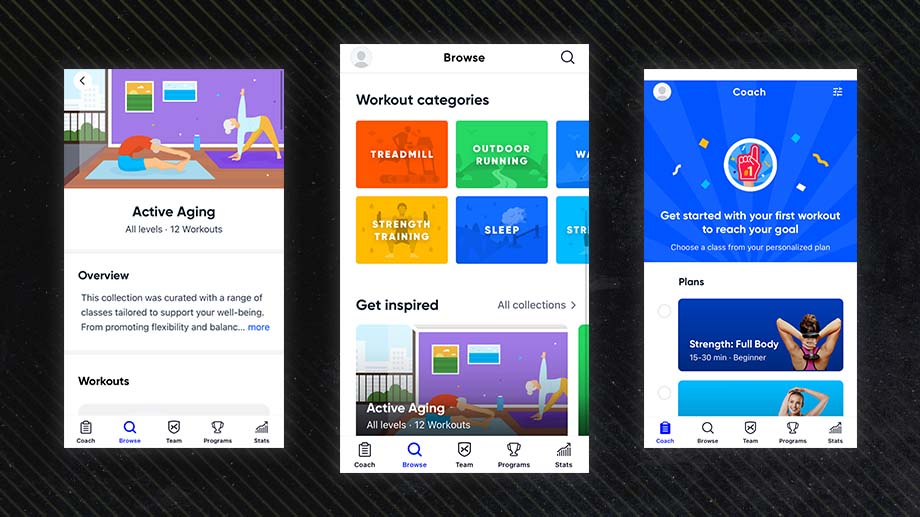
Aaptiv’s membership costs $14.99 per month and offers a free seven day trial. However, you do need to get the entire year plan in order to try the seven week trial, which isn’t the most convenient.
Best Workout App for Yoga: Alo Moves

For beginner and experienced yogis alike, Alo Moves can be an excellent download offering over 170 flows and sessions across a wide range of yoga categories. Additionally, the app has other programming for pilates, barre, HIIT, and strength training with new modules being added daily.
Specs
- Price Per Month: $12.99
- Equipment Required: Exercise Mat, Yoga Blocks, Yoga Straps, Free Weights
- Training Type: Yoga, Pilates, Barre, HIIT, Strength and Conditioning
- Available On: iOS
- Free Trial: 30 days
The amount of yoga strength athletes take part in is rising as both formats can greatly benefit from one another. If you fall into that category, gleaning the benefits of both yoga and strength work, we recommend downloading Alo Moves. The app boasts over 3,000 programs tailored to yoga, pilates, and barre, along with fitness-minded series for HIIT and strength training. Plus, the library is constantly growing with new modules being added daily.
In testing, we appreciated the assortment of available on-demand workouts and programs, but admittedly focused on the 171 available yoga flows. Our tester had no issues navigating through the available sessions, giving this yoga app’s user interface a 5 out of 5. We appreciated the clear labels that explained the duration of each flow, along with the intended intensity level.
They also noted that the instructors were clear and easy to follow along with, and appreciated how upfront they were with equipment requirements prior to the session. After trying the app myself, I’d give the instruction a 4.5 out of 5. The workouts are easy to follow, though you do have to rewind the videos if you miss a move.
The app also offers a unique skill-based library of series that can be great for developing your abilities. I tried the handstand program for two months and actually nailed the move! However, I have to give the accountability a 3 out of 5. There’s no option to work with a personal coach here, so you’re on your own when it comes to consistency.
We do want to note, though, that the Alo Moves platform is primarily centered around individual workouts and programs rather than working toward certain goals or progressive overload. If you prefer a structured regimen that’s planned for weeks, this may not be the best fit. If you need a good assortment of instructor-led workouts and don’t mind taking your sessions in a “choose your own adventure” aesthetic, this can be an excellent pick.
Best Workout App for Data Tracking: Peloton

No need to have Peloton equipment when you can have access to the app with a subscription. Take classes from popular coaches to help you get your run done and dusted.
Specs
- Price Per Month: $12.99-$44
- Equipment Required: Peloton-Enabled Cardio Machine, Bodyweight, Home Gym, Commercial Gym
- Training Type: Variety
- Available On: iOS, Android
- Free Trial: 30 days
Best-known for its at-home indoor cycling classes with one of the best exercise bikes in the biz, Peloton is among the most popular home fitness apps right now. And for those who like to keep a close eye on their stats and progress, this is our top pick.
Your personal metrics are incredibly easy to track, according to our tester, and the app connects to your personal fitness watch to offer as much accuracy as possible. Different workouts track different stats, like your calories burned, cadence, pace per mile, distance, heart rate, wattage, and more — we recommend pairing your workout routine to one of the best heart rate monitors for more informed data tracking. We also gave the user interface a 5 out of 5, as accessing this data is incredibly simple.
The Peloton experience is a little lacking in the accountability department if you go with the basic membership, our tester noted. “If you want more of the at-home gym experience, I recommend the All-Access option,” they said, giving this category a 3 out of 5. As an All-Access member, you can encourage other users in your classes and follow the in-class leaderboard.
We like the workout variety here, too, however, there aren’t any barbell training options — like deadlifts, front squats, or other barbell back exercises — our tester said. So, if you’re wanting an app that offers advanced strength training with progressive overload, this probably isn’t the best pick. However, you don’t actually need a Peloton machine to use the app, which adds to the accessibility.
Best Workout App for Running: Nike Run Club
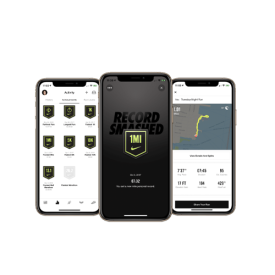
Set new running goals or just hit your weekly mileage with the free Nike Run Club app. You can try the app's race programs if you're preparing for your first 5K or go on a guided run with a Nike running coach.
Specs
- Price Per Month: Free
- Equipment Required: None
- Training Type: Running
- Available On: iOS, Android
- Free Trial: Free app
For those who are training for a race or looking to add running to their high-intensity workout regimen, I think Nike is among the best running apps. After using this app for years myself, I think this one is hard to beat, especially if you have new running goals.
This app is incredibly easy to navigate on iPhone and Android devices, earning a 5 out of 5 for user interface. There are plenty of workout options, from structured programs (like 5K or marathon training) to simple quickstart-style runs where you can pre-set a distance, time, or speed goal. My favorite aspect is how smoothly this app integrates with your personal music app, like Apple Music or Spotify. I love curating my own playlists while running and Nike took that into consideration.
I have to give the accountability a 3 out of 5. There’s no personal coaching involved with this app, though I do enjoy the coach-guided runs. Essentially, you select a goal-oriented coach-guided run, integrate your personal playlist, and listen to the coach’s instructions.
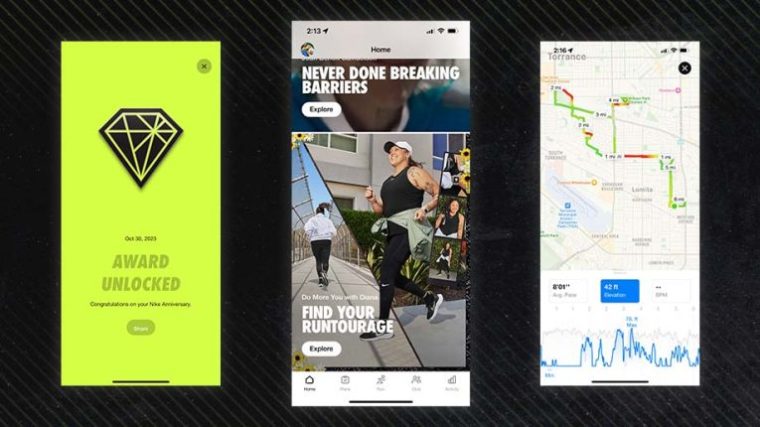
For the coach-guided runs, I’d give the instructions a 4 out of 5. The coaches do a great job of verbally guiding you through different effort levels, based on factors like your RPE and breathing. However, these are pre-recorded and aren’t too personalized — it’s on you to gauge your effort.
The non-existent price tag is pretty hard to beat, too. It’s hard to believe that this app is totally free, to be honest. While the workout library isn’t as dense as some other apps, the app is high quality and you can personalize your training programs when creating fitness goals.
Best Workout App for Strength Training: Juggernaut AI
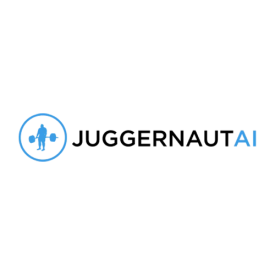
This AI-powered strength training app curates workouts for you based on your initial fitness levels and daily readiness. The more you log your data, the more your algorithm learns in an effort to keep you progressing through PRs.
Specs
- Price Per Month: $35
- Equipment Required: Free Weights, Barbell, Squat Rack, Commercial Gym
- Training Type: Powerlifting
- Available On: iOS, Android
For athletes wanting to build muscle, it’s tough to beat the performance we experienced with Juggernaut AI. As you can assume from the app name, this platform uses artificial intelligence to generate personalized lifting programs, and while you don’t get the same hands-on expertise you’d receive with a live or virtual coach, our tester said that the digital approach was more than helpful in their strength routine.
During trials, our tester enjoyed how much interaction you have with the app through readiness prompts each day before training. These prompts gauge how prepared you are for a given workout, along with other inquiries asking if you’re dealing with any soreness, fatigue, or other factors that may influence your training.
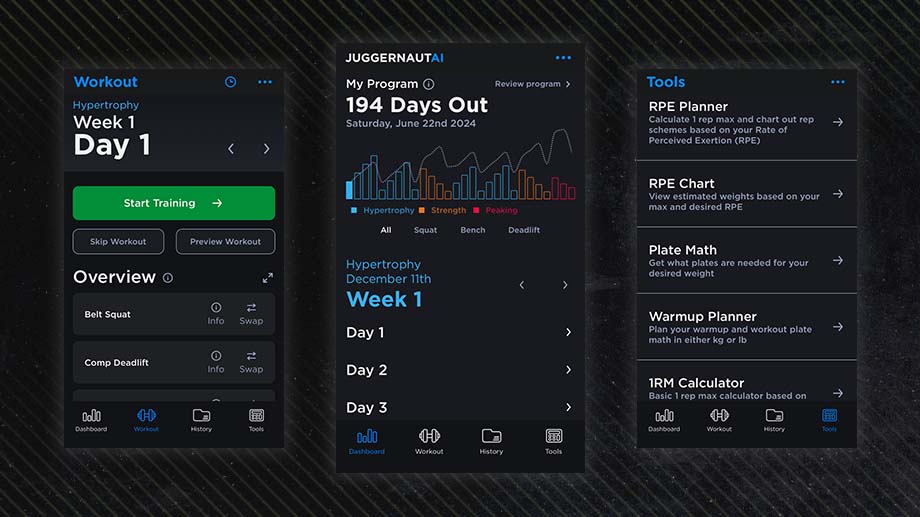
Between these prompts and logging your reps, sets, and weight totals, you’re in the app a lot, but our tester noted that the experience wasn’t overwhelming or annoying. Plus, all that logged data makes it easier for the AI platform to curate your recommended training schedule as it learns and progresses with you in the gym.
Speaking of the gym, we recommend having access to a good bit of strength equipment before signing up for this app. According to our tester, you should, at minimum, have a squat rack, weight bench, and barbell, and even some of the best weight plates at the ready to facilitate your training routine. Other items, like dumbbells, kettlebells, and resistance bands, can also be integrated into your plan, but the aforementioned pieces are a definite must.
In terms of training with Juggernaut AI, you get a good mix of challenge and progress. The app tailors your prescribed weights, reps, and sets to your responses in your readiness prompt, so there are limited opportunities for overtraining or failing a lift. Unfortunately, though, this app is solely focused on strength training. Athletes wanting a cardio-based workout plan should opt for another service.
Finally, we enjoyed the user interface of this app and felt its layout to be rather intuitive after the first few workouts. Some may find the text to be difficult to read, however, which we attribute to the black and blue color scheme. If you can look past this aesthetic, though, we think you’re in for a refreshing new take on bulking up.
[Related: The 10 Best Personal Training Apps of 2025 (Personally Tested)]
How We Tested and Chose the Best Workout Apps
The BarBend team is made up of competitive athletes, certified personal trainers, and lifelong fitness enthusiasts. For this round-up, we downloaded and subscribed to 19 different fitness platforms targeting strength and conditioning, nutrition, cardio, yoga, and other fitness categories. These are the factors we considered:
- Compatibility: We can go on about a fitness app’s library of workouts and certified trainers, but the first thing to really look for is if the platform is compatible with your digital device. We looked for platforms available on both iOS and Android operating systems to ensure programs and subscriptions were available to all athletes regardless of their phone plan.
- Workout Variety: Everyone has different goals and interests when it comes to fitness, so we looked for a variety of fitness apps catering to a wide range of disciplines and desires. We’ve included strength-focused programs offering excellent methods for achieving hypertrophy, as well as apps centered around cardio to help support your heart-pumping, calorie-burning sessions. Some apps cater to multiple disciplines with large libraries of live and on-demand classes, which can be great for keeping daily sessions fresh and engaging.
- Equipment Requirements: We also understand that not everyone has access to the same amount of fitness equipment, so we sought to include apps catering to a variety of situations. Some of our picks require no equipment at all with focuses on bodyweight training and stretching, while others require full-fledged cardio machines, strength training setups, or access to a commercial gym.
- User Experience: A fitness app is only useful if you don’t mind navigating through it. We included platforms that provided user experiences and interfaces that were interactive, engaging, and easy to figure out. We looked for any bugs or glitches and pointed them out whenever they occurred in our testing. Additionally, we examined each platform’s aesthetic to see if the color schemes and layouts were legible and understandable. If a service was difficult to read, yet still provided a benefit to our training, we made note of it.
- Price: We also looked at how costly each service was from a monthly perspective — would these digital services be a smart investment over other options like an in-person dietician or personal trainer?
Benefits of Workout Apps
Fitness apps can be handy tools for supporting your training and nutrition goals, especially if you’re at the starting line of your training, still wondering, “what is cardio?” Additionally, they often cost less than hiring an in-person instructor. Plus, they can be ideal for athletes struggling to compile a worthwhile regimen on their own. Below are some of the perks that come with adding one of these services to your home screen.
- Training Accountability: Some apps remind you to get your daily sessions in through push notifications, while others can go a step further by pairing you with a personal trainer that chats with you regularly to ensure you’re on the right path. This can be great for ensuring your rest days don’t begin to pile up in between sessions.
- Positive Support: Many fitness apps can offer congratulatory notifications once you complete a session or log a workout. While it may seem small, having that extra dose of positivity day in and day out can make a difference — keeping spirits high and maintaining a positive relationship with training can make it easier to hit your goals. (3)
- Accessibility: With fitness apps, your favorite training session is literally at your fingertips whenever you want. There’s no need to coordinate your schedule to an in-person trainer or a studio’s class schedule — you can fire up your subscription whenever (and wherever) you please.
- Progress Tracking: A lot of athletes are instructed to keep a training journal for their workouts, but creating your personal rolodex of past accomplishments can be tedious for some. Fitness apps can be great for keeping records of your past accomplishments and showcasing your progress over time.
How Much Do the Best Workout Apps Cost?
Different fitness apps can vary in price, depending on the membership you choose and the amount of first-person coaching. Our team selected apps with a variety of prices, so there’s something for everyone.
| Best Workout App Overall | Future | $199 per month |
| Best Workout App for Pilates | Reverse Health | Starting at $15 per month |
| Best Workout App for Personal Training | Caliber | Starts at $200 per month |
| Best Workout App for Live Classes | iFIT | $39 per month |
| Best Workout App for Weight Loss | Noom | $70 per month |
| Best Free Workout App | Nike Training Club | $0 per month |
| Best Workout App for Beginners | Aaptiv | $14.99 per month |
| Best Workout App for Yoga | Alo Moves | $12.99 per month |
| Best Workout App for Data Tracking | Peloton App | Starts at $12.99 per month |
| Best Workout App for Running | Nike Run Club | $0 per month |
| Best Workout App for Strength Training | Juggernaut AI | $35 per month |
How to Choose the Best Workout App
Downloading a fitness app can be an excellent way to get the ball rolling on your training regimen, but there are a few factors to think about before opting for one service or the next. Below are some considerations worth thinking through before hopping into the app store and deciding on a plan for your needs.
- Personal Fitness Goals: “You can narrow down your search a lot right from the get-go by determining what type of training you need to do in order to reach your desired outcome,” according to Amanda Capritto, CPT. Narrow your personal fitness goals and look for an app that can provide adequate guidance.
- Equipment Requirements: Take stock of your available equipment and, perhaps, what you’re willing to buy. Look for an app that fits with your available equipment and, if you don’t have any at your disposal, opt for an app that offers bodyweight training.
- Fitness Level: Consider what level of instruction you’ll need, recommends Capritto. “Beginners may want to consider a virtual personal training app, such as Caliber or Future, where they can connect with a certified professional and receive individualized feedback and programming,” she recommends. More advanced lifters probably don’t need super in-depth instructional videos and programs.
- Price: “Would you prefer an app that only requires a one-time payment, or are you cool with budgeting for a monthly subscription? If yes, how much can you pay each month? You’re naturally going to get a lot more out of an ongoing subscription, but if your goal is just to keep fit, you may not need an app that requires one,” Capritto says. Take a close look at the cost of different options to find something within your budget.
- Accountability and Coaching: For athletes who have specific goals in mind or are new to exercise, we recommend prioritizing an app with accountability and 1:1 coaching. This can help you stay consistent and give you a sense of direction.
Best Workout Apps FAQs
Do workout apps really work?
Whether fitness apps “work” is a subjective question, as your results with each platform rely heavily on how dedicated you are to using the services. Fitness apps can provide helpful instruction, engaging workouts, and even personalized coaching, but you need to have some willpower to use the assistance in your personal fitness journey. It’s best to think of fitness apps as tools — they can make the job easier, but you need to do the actual work.
Is there a free workout app?
Yes, there are a number of free workout apps out there, such as Nike Training Club, delivering solid workout plans to help you mix up your training sessions. Additionally, some fitness apps offer free trial periods at the start of your subscription to help you get a feel for the workout variety and platform offerings. Apps of this kind, however, often limit your capabilities within the service until you ultimately sign up and pay for the membership.
What is the best workout app?
Every athlete can have a different experience when it comes to workout apps. One service may work great for some, yet not as helpful for others. In our opinion, Future is the best workout app overall thanks to its emphasis on personalized training programs, sense of accountability created through interactions with your prescribed personal trainer, and helpful video demonstrations for each exercise.
How much do workout apps cost?
The price range of fitness apps is wide. Monthly memberships can range from free to $200 and beyond. We’ve included a variety of workout apps at differing price points above, with a majority of options coming in at under $100 monthly. In the end, though, it’s always wise to go with the app service that fits your budget and fitness desires best.
References
- Mahaffey, K. (n.d.). How much does a personal trainer cost & should you hire one?. NASM. https://blog.nasm.org/how-much-does-a-personal-trainer-cost
- Plotkin, D., Coleman, M., Van Every, D., Maldonado, J., Oberlin, D., Israetel, M., Feather, J., Alto, A., Vigotsky, A. D., & Schoenfeld, B. J. (2022). Progressive overload without progressing load? the effects of load or repetition progression on muscular adaptations. PeerJ, 10.
- Hagberg, L. A., Lindahl, B., Nyberg, L., & Hellénius, M. ‐L. (2009). Importance of enjoyment when promoting physical exercise. Scandinavian Journal of Medicine & Science in Sports, 19(5), 740–747.
